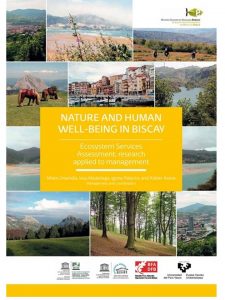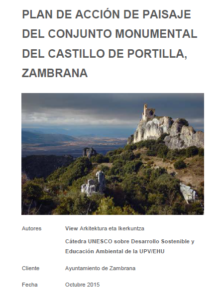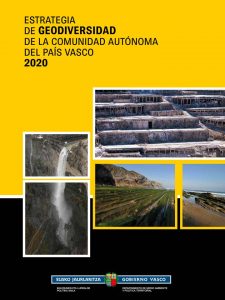[vc_row][vc_column width=”1/4″][vc_wp_custommenu nav_menu=”14″][/vc_column][vc_column width=”3/4″][vc_tta_tabs layout=”trendy”][vc_tta_section title=”MILLENIUM ECOSYSTEM ASSESSMENT IN BISCAY” tab_id=”1562079521806-3d54e768-2164″][vc_column_text]
UNESCO Chair on Sustainable Development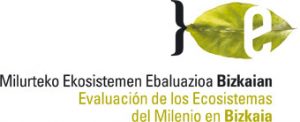 and Environmental Education of the University of the Basque Country, with the support of the Environment Department of the Regional Government of Bizkaia, is conducting the research project “Millenium Ecosystem Assessment in Biscay”.
and Environmental Education of the University of the Basque Country, with the support of the Environment Department of the Regional Government of Bizkaia, is conducting the research project “Millenium Ecosystem Assessment in Biscay”.
The purpose of this project is to develop in Bizkaia the conceptual and methodological framework of the International Scientific Programme UN Millenium Ecosystem Assessment with the aim of generating scientific knowledge about the consequences of changes in ecosystems due to the impact of current policies that can be applied in the public and private sectors; and to present possible response options. Special attention to the concept of natural capital, to the estimation of the ecosystem services and how they are affected by human activities is provided. It also aims to establish as far as possible, the critical natural capital in Bizkaia, defined as the essential and irreplaceable in the short-medium term natural resources.
In the Project the Autonomous University of Madrid takes part through the Socio-ecosystems Laboratory of the Interuniversity Ecology Department, assisting the research group in applying the methodology that this project seeks to implement in Bizkaia. UNESCO Etxea – UNESCO Basque Country Centre takes part as well in the project in matters related to communication and internationalisation.
The results obtained in the project are included in the book “Nature and human well-being in Biscay”.
[/vc_column_text][/vc_tta_section][vc_tta_section title=”PORTILLA CASTLE PAP” tab_id=”1562079521819-71e19236-4a12″][vc_column_text]
[/vc_column_text][/vc_tta_section][vc_tta_section title=”ENVIRONMENTAL FRAMEWORK 2020″ tab_id=”1562079540946-b654ad11-2dd3″][vc_column_text]
ENVIRONMENTAL FRAMEWORK 2020
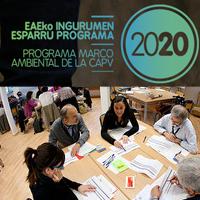 The Department of Environment and Territorial Planning of the Basque Government to address major environmental and sustainability challenges in the global horizon, has set a new challenge “Building together a new environmental scenario in the Basque Country” here 2020.
The Department of Environment and Territorial Planning of the Basque Government to address major environmental and sustainability challenges in the global horizon, has set a new challenge “Building together a new environmental scenario in the Basque Country” here 2020.
This is to promote a shift in environmental policy in the Basque Country to help build the environment of the future. To achieve this it is essential collaboration with citizens for consensus among all of the most suitable model country in environmental matters. For this reason, this project conducted public participation in UNESCO Chair and the company Kualitate Lantaldea collected reflections, concerns and suggestions from the public on the most important environmental issues in the Basque Country.
Participatory processes carried out in June 2014:
- Environmental Framework Programme 2020: Participates in defining environmental policy in the Basque Country. Society and social partners (June 5, 2014)
- Environmental Framework Programme 2020: Company Participatory Process Empresa. 50 ideas to built a new environmental scenario in Euskadi (June 10, 2014)
[/vc_column_text][/vc_tta_section][vc_tta_section title=”BASQUE CLIMATE CHANGE PLAN 2020″ tab_id=”1562079541577-4599ba54-80b8″][vc_column_text]
BASQUE CLIMATE CHANGE PLAN 2020
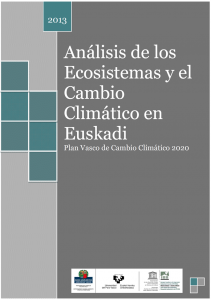 The Basque Climate Change Plan 2008-2012 was the first major milestone in Euskadi planner in relation to climate change. The Basque Government considered necessary to carry out an update of the plan, with an eye to the coming years. To do this, they have proposed the development of a 2014-2020 plan to better fit into the European Strategic planning horizons incorporating proposals in response to a time horizon of medium to long term, taking into account the latest developments, trends and commitments level European and international (2030-2050).
The Basque Climate Change Plan 2008-2012 was the first major milestone in Euskadi planner in relation to climate change. The Basque Government considered necessary to carry out an update of the plan, with an eye to the coming years. To do this, they have proposed the development of a 2014-2020 plan to better fit into the European Strategic planning horizons incorporating proposals in response to a time horizon of medium to long term, taking into account the latest developments, trends and commitments level European and international (2030-2050).
In this context, UNESCO Chair has been entrusted with preparing a report on the analysis of the interrelationships between terrestrial ecosystems and climate change in the Basque Country. It is especially caters to terrestrial ecosystems most affected by climate change, and the most vulnerable to extreme weather events areas, and an overall assessment of the impact on natural capital and key ecosystem services are performed. In addition, it is to know the impact of climate change on the landscape configuration and define processes that can be largely affected.
[/vc_column_text][/vc_tta_section][vc_tta_section title=”PUBLIC PARTICIPATION PROCESS FOR THE ELABORATION OF THE BASQUE GEODIVERSITY STRATEGY” tab_id=”1562079542218-f316a5ea-668f”][vc_column_text]
PUBLIC PARTICIPATION PROCESS FOR THE ELABORATION OF THE BASQUE GEODIVERSITY STRATEGY
The objective of this project was to open a public participation process to public administrations, citizens and interest groups that would collect the largest number of contributions, amendments, opinions and suggestions to the Geodiversity Strategy of the Basque Country and Inventory of Geosites.
UNESCO Chair participated with Kualitate Lantaldea in the elaboration of the Public Participation Process for the elaboration of the Basque Geodiversity Strategy.
[/vc_column_text][/vc_tta_section][vc_tta_section title=”URDAIBAI PRUG” tab_id=”1562079542855-c8fb3255-e26b”][vc_column_text]
URDAIBAI PRUG
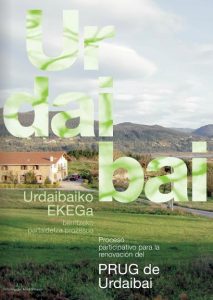
The Technical Office of the Urdaibai Biosphere Reserve and the UNESCO Chair on Sustainable Development and Environmental Education of the UPV / EHU have carried out a participatory process to renew the Rector Plan of Use and Management (PRUG) of Urdaibai Biosphere Reserve.
The current PRUG of Urdaibai was approved by Decree 242/1993, on August 3, 1993, and provides in Article 9 its revision ten years after its entry into force. Thus, in 2003 the PRUG was updated promptly, through Decree 27/2003 of February 11, modification of the PRUG of Urdaibai, which mainly includes the correction and updating mapping and modification of specific aspects of the text of the articles of PRUG.
As part of this revision, between 2011 and 2012, there has been a process of scientific and technical participation with the objective of developing the scientific and technical foundations of future PRUG from the contribution of experts in the various issues addressed that document.
The contents of PRUG have been divided into five blocks for better analysis:
+Legal aspects
+ Special Protection Areas
+ Areas Protection
+ Areas Systems in the territory, towns and rural land
+ Areas of agrarian interest and forestry, tourism and rural development
These contents have been debated in scientific and technical participatory workshops. As a result of this process, in 2012 the UNESCO Chair on Sustainable Development and Environmental Education of the University of the Basque Country UPV / EHU edited a publication with the results of this Participatory process for the renewal of Urdaibai PRUG.
[/vc_column_text][/vc_tta_section][vc_tta_section title=”ERASMUS+BELIEVE” tab_id=”1718193451600-1a3594e5-532d”][vc_column_text]
ERASMUS+BELIEVE

Project title: Believe in climate change – development of analytical competences and critical thinking of youth – CC Believe.
CC Believe Project is an international initiative focusing attention on the problem of finding the truth in cognitive processes related to climate change. In particular, we want young people to be able to search and analyze information, in particular to distinguish reliable data from manipulation and inappropriate interpretations.
Project goal
The main goal of the project is to develop an educational game using augmented reality-AR, to help young people developing learning skills, analytical competences and critical thinking in the field of protection environment and climate change.
The intention of the cooperating organizations is to carry out, within 24 months, conceptual, production and pilot projects, leading to the creation of a common youth education tool in the form of a board game with the latest one AR technology. Playing the game will be an educational process and will address the problem of manipulation and dissemination fake information about climate change in the public space, and the game mechanics will develop competences and young people’s ability to analyze and select content.
Project partners
The project is realized by partnership of 2 institutions:
– 5Klepek Michał Klepka – Project leader (Poland)
– UNIVERSIDAD DEL PAIS VASCO/EUSKAL HERRIKO UNIBERTSITATEA – Project partner (Basque Country)

Financiado con fondos de la UE. Los puntos de vista y opiniones expresados son únicamente los del autor o autores y no reflejan necesariamente los puntos de vista y opiniones de la Unión Europea o de la Agencia Ejecutiva Europea de Educación y Cultura (EACEA). Ni la Unión Europea ni la EACEA son responsables de las mismas.
[/vc_column_text][/vc_tta_section][/vc_tta_tabs][/vc_column][/vc_row]
